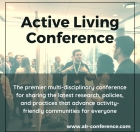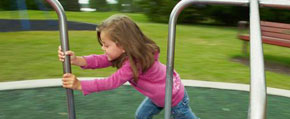7:15 a.m. - 4:00 p.m. Conference Registration
7:00 a.m. - 8:00 a.m. Breakfast
8:00 a.m. - 8:15 a.m. Welcome and Announcements
8:15 a.m. - 8:30 a.m. Update on the National Collaborative on Childhood Obesity Research (NCCOR)
NCCOR Update [pdf], Robin McKinnon, Ph.D., M.P.A., Health Policy Specialist, National Cancer Institute
8:30 a.m. - 9:00 a.m. Plenary Presentation
Healthy Kids, Healthy Communities in Washington, D.C., Jenne Johns, M.P.H., Summit Health Institute
9:00 a.m. - 10:00 a.m. Panel Presentation
Reversing the Childhood Obesity Epidemic by 2015: How to Do It?
Creating change is hard; creating change rapidly is much harder. But rapid change is needed so we do not lose a generation of children to chronic obesity. This interactive panel discussion features leaders who have bold visions and plans for making them real. Transportation For America is a coalition of organizations working to change the entire approach to transportation - quickly. Resources for the Future is working to ensure all communities have access to public open space. Following their presentations, the audience will be invited to offer ideas for reversing childhood obesity in the next 5 years. Researchers listen closely for innovative study topics.
Moderator
Kevin Patrick, M.D., M.S., University of California, San Diego
Panel Members
Transportation Policy: An Opportunity to Reverse Obesity [pdf], Shireen Malekafzali, PolicyLink
The Outdoor Resources Review Group: Mission, Activities, Final Reports [pdf], Margaret Walls, Senior Fellow, Resources for the Future
10:00 a.m. - 10:30 a.m. Break and Group Physical Activity
10:30 a.m. - 12:00 p.m. Concurrent Presentation Sessions
SESSION 1 - Active Transportation for Adults
a) Association of Workplace Supports with Active Commuting, Andrew Kaczynski, Ph.D., Kansas State University
b) Journey to Work by Public Transit and Objective Measures of Physical Activity in the Neighborhood Quality of Life Study (NQLS): Where You Live, Where You Work and How You Get There, Ugo Lachapelle, M.Sc., University of British Columbia
c) Safe Routes for Seniors: Improving Walkability for Seniors in New York City, Shin-pei Tsay, M.Sc., Transportation Alternatives
d) If You Build It, Will They Come? The Health Impact of Constructing New Bike Lanes in New Orleans, Louisiana, Kathryn Parker, M.P.H., Prevention Research Center at Tulane University
SESSION 2 - Engaging Communities
a) A Comprehensive Multi-Level Approach for Passing Safe Routes to School and Complete Streets Policies in Hawaii, Katie Heinrich, Ph.D., University of Hawaii
b) Urban Environments and Physical Activity of School Journeys Among Children in City of Turku, Finland, Anna Broberg, M.Sc., Helsinki University of Technology
c) Factors Associated with Bicycling to High School in Davis, CA, Susan Handy, Ph.D., University of California Davis
d) Child's Play: Community Solutions for Increasing Youth Physical Activity in Distinct Safety Contexts, Stephanie L. Phibbs, M.P.H., University of Colorado, Denver
SESSION 3 - Physical Activity in Schools
a) School Adoption of Evidence-Based PE, Monica Lounsbery, Ph.D., University of Nevada, Las Vegas
b) Perceived Constraints on Middle School Sport Participation, Jonathan Casper, Ph.D., North Carolina State University
c) Communicating Research to School Decision-makers to Strengthen Physical Activity Policies, Lindsey Cox, M.S., California Project LEAN
d) Community Differences in Supportive Environments for Extracurricular Physical Activity in North Carolina Middle Schools, Michael Edwards, Ph.D., Texas A&M University
12:00 p.m. - 1:30 p.m. Networking Lunch Discussion Tables
1:30 p.m. - 2:45 p.m. Concurrent Presentations Sessions
SESSION 1 - Community Design for Youth
a) Walkable Community Design and Physical Activity in Children, Barbara Brown, Ph.D., University of Utah
b) The Interactive Contribution to Adolescent Physical Activity of Psychosocial and Environmental Variables, Dan Graham, Ph.D., University of Minnesota
c) Understanding the Determinants of Active Transportation to School among Children Living in Poverty: Evidence of Environmental Injustice from the Quebec Longitudinal Study of Child Development, Roman Pabayo, M.Sc., University of Montreal
SESSION 2 - Safe Routes to School
a) Geographic Distribution of Safe Routes to School Funds: Analysis & Innovative Institutional Models, Noreen McDonald, Ph.D., University of North Carolina at Chapel Hill
b) Focusing on the Fifth "E": Evaluating Portland's Safe Routes to School Program, Stephen White, M.U.R.P., Portland State University
c) Safe Routes to School: Communities Creating Policy, Environmental and Behavioral Changes, Tracy McMillan, Ph.D., M.P.H., PPH Partners
SESSION 3 - Evaluation and Measurement
a) Using Active Living Principles to Increase Physical Activity in Rural Communities: 5 Case Studies, Timothy Schwantes, M.S.W., M.P.H., Active Living by Design
b) Social and Physical Contextual Influences on Children's Physical Activity Levels: An Ecological Momentary Assessment Study, Genevieve Dunton, Ph.D., M.P.H., University of Southern California
c) Using Google Street View to Implement Community Audit Tools: The Pedestrian Environment Data Scan, Andrew Rundle, Dr.P.H., Columbia Mailman School of Public Health
2:45 p.m. - 3:00 p.m. Break
3:00 p.m. - 4:00 p.m. Plenary Presentations
1) Engaging Community Providers to Create More Active After-School Environments: Results from the Ontario CATCH Kids Club Implementation Project, Erin Sharpe, Ph.D., Brock University
2) A University-Community Partnership to Create and Evaluate Environmental Change in Disadvantaged Areas, Steven P. Hooker, Ph.D., University of South Carolina
4:00 p.m. - 4:30 p.m. Funders Update
4:30 p.m. - 4:45 p.m. Closing Remarks and Give-Away Prizes
James F. Sallis, Ph.D., Director, Active Living Research







